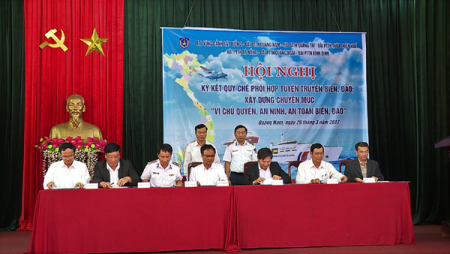The management and protection of sovereignty, security and order in the seas and islands are an important content of our State. Accordingly, the state management of security and order at sea is carried out by sectors and branches, in which each state organ is in charge of one (or several) fields according to its functions and responsibilities. Therefore, the coordination between the Vietnam Coast Guard (VCG) and relevant agencies, organisations and forces is an objective requirement to improve the effectiveness of law enforcement at sea.
 |
| Commanders of the VCG Region 2 and leaders of 6 central provincial radios and televisions sign coordination regulations on propagation |
On the scope and principles of coordination: VCG shall assume the prime responsibility for, and coordinate with agencies, organisations and functional forces of the ministries, ministerial-level agencies and provincial people's committees in performing its tasks and powers as prescribed in the Law on Vietnam Coast Guard 2018 and other relevant laws. The Minister of National Defence shall detail the coordination between VCG and other forces of the Ministry of National Defence. The coordination must be based on the tasks and powers of agencies, organisations, forces of ministries, ministerial-level agencies and provincial-level people's committees as prescribed by law; not obstruct lawful activities of agencies, organisations and individuals at sea. VCG and functional agencies, organisations and forces of ministries, ministerial-level agencies and provincial-level people's committees directly coordinate with each other to promptly solve cases and assist each other in exercising their powers and duties prescribed by law. At the same time, they must ensure the centralised management, unity and confidentiality of information on national defence and security and professional measures of functional agencies, organisations and forces during the coordination; ensure the initiative, flexibility, specificity and efficiency, and the role and accountability of the head of the agency in charge of the coordination. In the same waters, when detecting violation of law related to the tasks and powers of many agencies, organisations and forces, those who first detect the case shall handle them according to their authority.
Contents of coordination include: (1) Exchanging information and documents; proposing the formulation of legal documents; (2) Protecting national security, sovereignty, sovereign rights and jurisdiction at sea; (3) Protecting marine resources and environment; protecting property of the State, organisations and individuals; life, health, honour and dignity of individuals operating lawfully at sea; (4) Patrolling, inspecting, controlling and maintaining security, order and safety at sea; preventing, detecting, curbing and fighting against crimes and violations of law; fighting, preventing and combating piracy and armed robbery against ships; (5) Preventing and controlling of natural disasters; searching, rescuing and responding to, and remedying marine environmental incidents; (6) Training, coaching and fostering VCG officers and soldiers; propagating, disseminating and educating the people about the law; (7) Conducting international cooperation; (8) Implementing other related coordination activities.
The above provisions create a solid legal foundation for VCG and other functional agencies, units and forces of ministries, branches and local authorities to coordinate, improve the effectiveness and efficiency of managing and protecting the sacred seas and islands of the Fatherland.
PHAM BINH